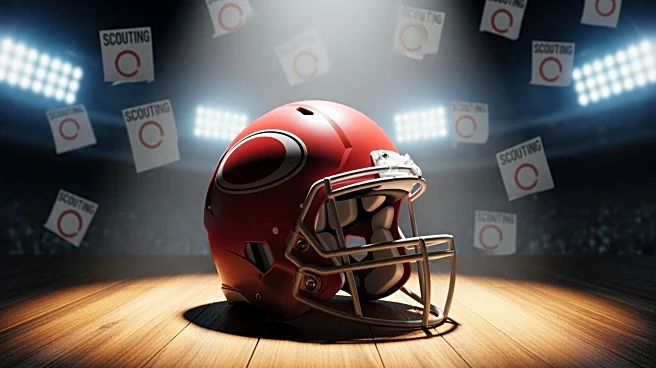What's Happening?
Wisconsin Badgers football coach Luke Fickell is under scrutiny following reports from NFL scouts who have expressed dissatisfaction with his coaching style and personal demeanor. Over the past three years,
Fickell has struggled to secure wins for the Badgers, and his reputation among NFL teams has been tarnished by allegations of dishonesty. According to John Middlekauf on the '3 & Out' podcast, Fickell is not only disliked by many NFL teams but is also considered a liar. This negative perception could impact the future of Wisconsin's athletic director Chris McIntosh, who is responsible for maintaining the integrity and success of the university's sports programs. Despite these challenges, some influential figures, such as Milwaukee-based businessman Ted Kellner, continue to support Fickell, citing his coaching resume as evidence of his capabilities.
Why It's Important?
The controversy surrounding Luke Fickell's coaching tenure at Wisconsin highlights the complex dynamics between college sports programs and their stakeholders, including donors, alumni, and professional scouts. The negative feedback from NFL scouts could potentially affect the recruitment and development of players aspiring to enter the NFL, thereby impacting the university's reputation and future success in college football. Additionally, the financial implications of Fickell's $25 million buyout clause present a significant challenge for the university, as it must weigh the costs of retaining or replacing him. The situation underscores the broader issues of accountability and performance in collegiate athletics, where the expectations of various stakeholders must be balanced against financial and strategic considerations.
What's Next?
The future of Luke Fickell and Chris McIntosh at Wisconsin remains uncertain, as the university must decide whether to continue supporting them or seek new leadership. The decision will likely depend on the perspectives of key donors and stakeholders, such as Ted Kellner, who have significant influence over the university's athletic programs. If the current dissatisfaction among NFL scouts persists, it may prompt further discussions about the direction of the Badgers' football program and the potential need for change. The outcome of these deliberations will have lasting implications for the university's sports culture and its ability to attract top talent.
Beyond the Headlines
The situation with Luke Fickell at Wisconsin raises broader questions about the ethical and cultural dimensions of college sports. The allegations of dishonesty and unlikability suggest a need for greater transparency and integrity in coaching practices. Furthermore, the influence of financial considerations, such as buyout clauses and donor preferences, highlights the complex interplay between money and decision-making in collegiate athletics. These issues may prompt a reevaluation of how universities manage their sports programs and the values they prioritize in their leadership.









